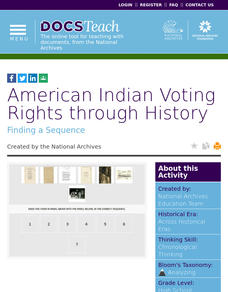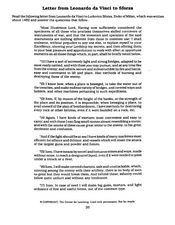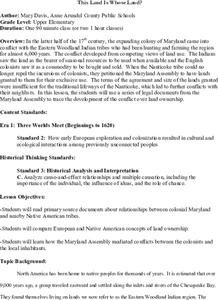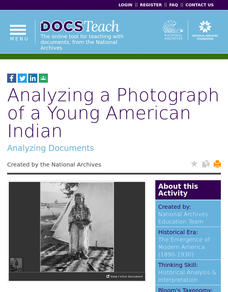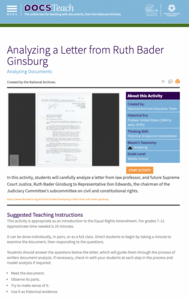DocsTeach
Prohibition and Its Consequences
Organized crime and speakeasies ... just another day during Prohibition. An intriguing activity explores the world of Prohibition and its consequences on life in the United States. Scholars analyze primary sources and place them on a...
DocsTeach
American Indian Voting Rights through History
Vote ... it's your right! An enlightening lesson examines the history of voting rights for Native Americans. Leaners analyze primary documents and place them in chronological order. Academics also create a list of other events that took...
PBS
Pearl Harbor and the Internment of Japanese Americans during World War II
Balancing national security and civil liberties can be tricky. To appreciate the tension between these two concepts, class members investigate the Japanese attack on the U.S. Naval Base at Pearl Harbor and President Franklin D....
DocsTeach
African American Soldiers and Civil Rights During WWI
Young scholars analyze primary source documents and images to determine how African American soldiers were denied their civil rights during World War I.
PBS
Civil War: Blacks on the Battlefield
Imagine a war being fought to free slaves, with slaves on the front line. Scholars use primary documents, videos, and research in the second installment of a three-part series to guide their analysis of the first African-Americans on the...
Curated OER
Post-1865: Effects of the War
An engaging lesson plan focuses on the impact of the war and Lincoln's plan for Reconstruction had on the United States. Historians analyze primary documents, such as Constitutional Amendments and newspaper experts. They also participate...
Facing History and Ourselves
The World the War Made
The United States Civil War forced Northern and Southern societies, as well as the people who made up those societies, to reconstruct their vision of themselves and their identities. A series of video-based web lessons look at the great...
DocsTeach
Comparing American and French Revolutionary Documents
This document or that? Historians compare crucial documents from both the American and French Revolution to gain a better understanding of the purpose and impact the documents had on each nation. Academics read excerpts from both...
DocsTeach
The Titanic Disaster: One Survivor's Story
An activity focuses on Lucy Ridsdale, a survivor of the sinking of the Titanic. Scholars analyze primary sources and place them in the correct sequence. Academics also complete a worksheet and participate in group discussion to...
ReadWriteThink
Captioning the Civil Rights Movement: Reading the Images, Writing the Words
Scholars boost their knowledge of the Civil Rights Movement with a lesson plan that challenges writers, readers, and historians to analyze primary sources and caption their observations. By way of reading, writing, discussion,...
Curated OER
What Can We Learn From the Past?
What would future archeologists learn from your scholars' personal belongings? Have them bring in a box of "primary sources" from their home. Discuss the difference between observations and inference, using some of your own items to...
Curated OER
World Cup: Did England rig the results?
Students discuss a rugby match to understand its world implications. In this rugby lesson, students read and analyze primary documents to find how sports effect world relations. Students answer critical thinking questions related to the...
Curated OER
The Impact of the Civil Rights Movement
Deepen understanding of the Civil Rights Movement with this collection of primary documents. This resource contains 22 video transcripts about desegregation, voting rights, black power, Dr. Martin Luther King Jr., and more. You might...
Curated OER
Many Passages: The Voyage of the Slave Ship Brookes
Examine three perspectives of the slave trade - captain, sailor, and captive - through this collaborative analysis activity. Small groups study one perspective with a primary source to analyze. They discern what is a historical fact and...
Curated OER
Letter from Leonardo da Vinci to Sforza
Expose your class to words directly from Leonardo da Vinci with this primary source document. Learners analyze the document, a letter from Leonardo da Vinci to Ludovico Sforza, the Duke of Milan, and respond to 3 short answer questions....
Center for History Education
This Land is Whose Land?
Whose land is it, anyway? Young scholars debate the question using primary sources from a case where Maryland indigenous people petitioned for land rights after they lost their original tribal lands. An included chart helps organize...
West Virginia Department of Education
Harpers Ferry Letters
Scholars write letters as if they were someone who heard the story of John Brown's raid. The resource, a standalone, covers information from primary sources that is important to West Virginian history: the Harpers Ferry Letters.
Curated OER
"Uncle Sam's Got Himself in a Terrible Jam": Protest Music and the Vietnam War
"And it's one, two, three...what are we fighting for?" Use music to assess the climate of protest during the Vietnam War, listening to and analyzing Country Joe MacDonald's "I-Feel-Like-I'm-Fixin'-To-Die Rag" (lyrics included)....
DocsTeach
Analyzing a Photograph of Clara Barton
Just who was Clara Barton? Using an archive photo from the National Archives, class members consider the legacy of the founder of the American Red Cross. The activity includes the photograph, along with prompts to help young scholars...
DocsTeach
Analyzing a Photograph of a Young American Indian
A true glimpse of the past, Angelic La Moose smiles back from more than 100 years ago. Young learners examine the picture of a young girl on a Montana Native American reservation from 1913 to comb it for historical details. A form, which...
DocsTeach
Analyzing a Letter from Ruth Bader Ginsburg
Before her career as a Supreme Court Justice, the Notorious RBG was a legal activist for women's rights. Using a letter from then-Professor Ginsburg, young historians carefully examine a letter from Ginsburg to a member of Congress...
DocsTeach
Patent Analysis: Alexander Graham Bell's Telephone
Believe it or not, the plugs and wires on Alexander Graham Bell's patent application for telegraph improvements has a direct connection to devices today. Young historians examine the fine details of the patent application. After they...
Curated OER
Current Event Project
One of the best ways to make history relevant and engaging is to analyze current events before they become history! Check out these project guidelines for a current event research paper, outlining the major required sections of the...
National WWII Museum
“My Dear Little Boys…” Interpreting a letter home from the war
Letters have long been prized by historians as primary sources for what they reveal not only about events but also about the emotional responses of the writers to these events. "My Dear Little Boys," a letter written by Leonard Isacks on...



